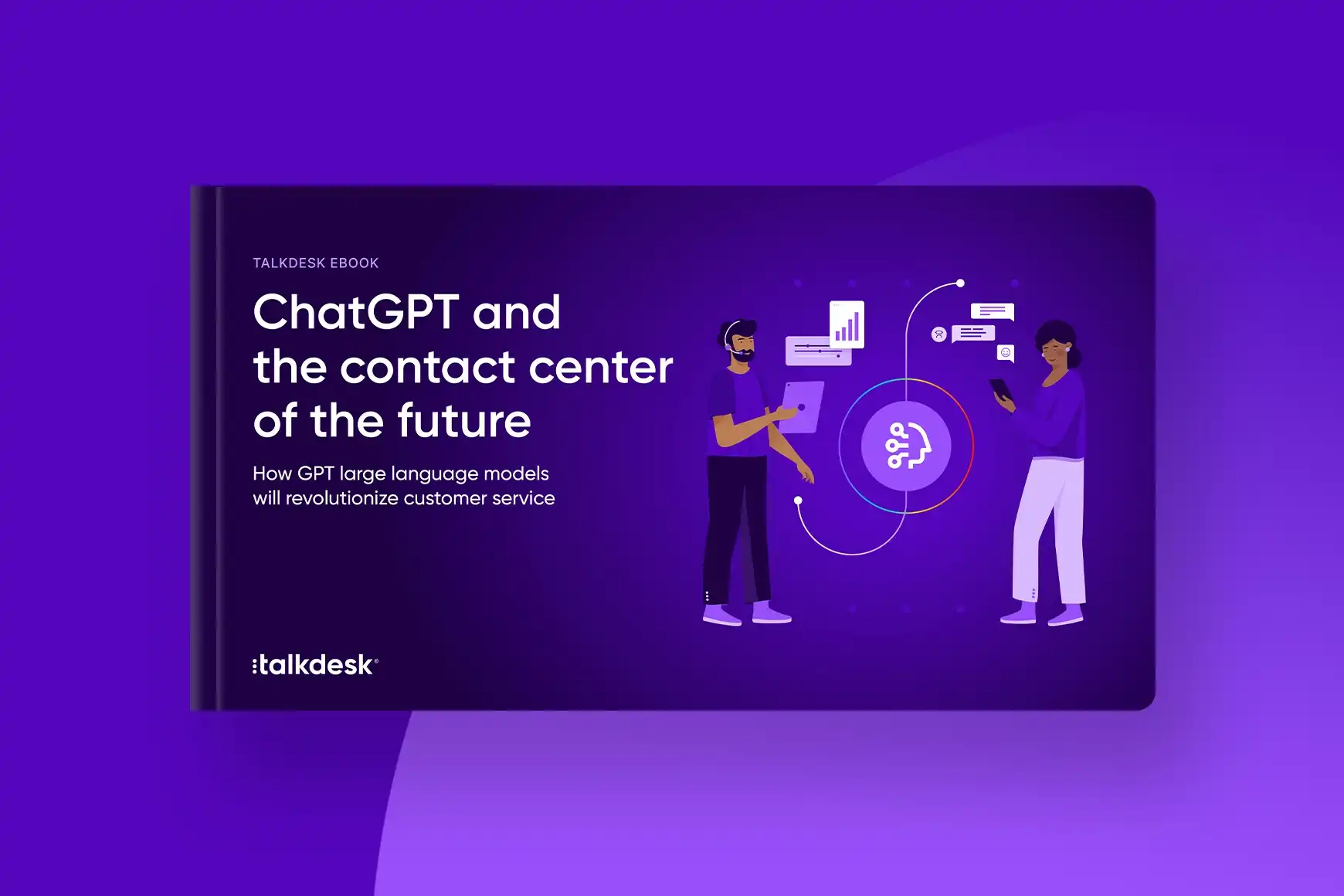¿Cuál es el problema con ChatGPT en el centro de contacto?

By Ben Rigby
0 min de lectura

Explorando las preocupaciones éticas de ChatGPT en el centro de contacto.
I’ve been writing feverishly lately about the opportunity ChatGPT (and other generative AI systems) presents for the contact center. At Talkdesk, we believe that the generative pre-trained transformer (GPT) large language models (LLMs) powering systems like ChatGPT are going to be the backbone of the next generation of contact centers as a service (CCaaS).
We’ve launched our first feature that harnesses these capabilities to automatically summarize customer conversations and accurately select their dispositions (e.g., requests follow-up, wants to cancel service, etc.)—effectively eliminating most of a customer service agent’s after call work. And we are actively integrating these LLMs into other core contact center use cases, as well as shaping our roadmap to accelerate the value our customers can gain from these natural language processing techniques.
Pero también entendemos la magnitud de esta nueva tecnología y el potencial que tiene para hacer tanto daño como bien.
A number of prominent tech leaders—including Elon Musk, Steve Wozniak, and Andrew Yang—are publicly calling for a pause in the training of AI systems more powerful than ChatGPT-4. Their general ethical concern is that runaway AI will overtake humanity’s ability to harness it for good.
Con estos grandes nombres opinando sobre algunos aspectos negativos de los sistemas de IA, pensé que sería un buen momento para delinear algunas de las principales preocupaciones éticas de estos nuevos LLM para el centro de contacto. Cualquier empresa que esté considerando utilizar estos modelos de IA en su centro de contacto debe ser consciente de los posibles obstáculos y considerar procesos que ayuden a garantizar experiencias seguras y positivas para los clientes.
¿Está interesado en obtener más información?
Póngase en contacto con nuestro equipo para ver cómo Talkdesk puede mejorar el nivel de sus soluciones de Software para Centros de Contacto.
Cinco preocupaciones éticas de ChatGPT en el centro de contacto.
1. Transparencia.
The first ethical concern with using ChatGPT and other generative AI systems in the contact center is transparency, which applies both to being clear about how an AI-driven decision was made as well as the fact that it was made by AI in the first place. Customers have the right to know if their interaction was mediated by AI. If customers believe they are talking to a human and later discover that they were talking to a chatbot, for example, it could erode trust in the company and damage customer relationships with the brand. Full disclosure to the customer is crucial when designing chatbots and virtual agents.
2. Sesgo.
Another ethical concern is the potential for bias in the responses of chatbots and virtual agents. ChatGPT is a machine learning model that is trained on vast amounts of text data, and there is a risk that this data could be biased in some way. If, for example, an automatic quality review favors one pattern of speech over another, this could lead to unequal treatment of agents whose backgrounds included learning that pattern of speech. In other words, this type of bias can lead to discrimination.
3. Seguridad y privacidad de los datos.
When using ChatGPT, user interactions are logged and stored, and personal conversations could be accessible to anyone if proper security measures are not in place. As with any software system handling personally identifiable data, data flowing through the LLM needs to remain encrypted end to end and follow all of the data privacy considerations that keep customers’ data safe.
4. Salida veraz.
Otra preocupación ética es la posibilidad de que ChatGPT "alucine" o invente respuestas que pueden no ser veraces, pero que transmiten estos hechos alternativos de una manera convincente. Por supuesto, no queremos brindar información errónea a los clientes, especialmente si la utilizan para tomar decisiones de vida.
5. Desplazamiento laboral.
Finally, there is the concern of job displacement. As more companies turn to AI-based chatbots like ChatGPT, there is a risk that human contact center agents could lose their jobs. Companies must consider the impact that automation could have on their employees and take steps to mitigate any negative effects. In particular, contact center managers should imagine new opportunities to increase agent satisfaction by introducing tools that will automate menial tasks and help agents complete their work faster.

Libro electrónico
ChatGPT y el centro de contacto del futuro
Descubra cómo esta nueva y apasionante tecnología lo cambiará todo, desde la IA conversacional hasta el rol del agente del centro de contacto.
¿Pausa en GPT-4?
La velocidad de los avances recientes en los LLM ha sido asombrosa y existen preocupaciones legítimas, como se describió anteriormente. El rápido desarrollo de la IA sin salvaguardias (al menos, consideración y mitigación de los resultados negativos) podría hacer que esos resultados negativos cobren vida en una escala mucho mayor de la que ya han comenzado a hacerlo.
The Future of Life Institute (FLI)—the author of the open letter calling for a pause—wants to ensure that AI technology is developed in a way that benefits humanity and avoids potential risks and dangers. They are concerned that the major AI labs are in an “out-of-control” arms race, and currently, there is no proper oversight ensuring they are working in an ethical manner.
Seguiremos atentamente estas discusiones a medida que evolucionen con el tiempo. Pero nuestro compromiso con nuestros clientes y con los millones de personas que interactúan con nuestros sistemas de software todos los días es evaluar continuamente el impacto de nuestras decisiones frente a las consideraciones éticas descritas anteriormente.
Entonces, ¿es ético utilizar ChatGPT en el centro de contacto?
In short, yes…with the appropriate precautions. For the LLM-powered features that we’ve already delivered to market and those we are developing, we at Talkdesk have already taken steps to minimize the potential ethical issues described above. We allow for transparent decision-making in the development process. We include modification by a human reviewer to remediate bias if it should exist. We maintain an absolute commitment to data privacy and security. We include anti-hallucination techniques in all our product designs to ensure no misinformation reaches our clients or their customers. And we give careful consideration to the impact of LLMs on human agents—with an eye toward imagining expanded roles for humans in the age of automation (I recently wrote about the concept of steering agents that oversee a team of bots).
Si bien los LLM mejorarán la calidad del servicio para los millones de nosotros que buscamos ayuda y apoyo de las empresas que amamos, corresponde a los ingenieros de software, diseñadores y líderes de productos entre nosotros considerar y abordar estas preocupaciones éticas a medida que construimos.
Vea cómo ChatGPT revolucionará el servicio al cliente.
Join me and Brooke Lynch, CCW Digital’s Senior Analyst, to learn how ChatGPT and generative AI is going to fundamentally change our understanding of customer service and the role of the contact center. In this conversation, I will explain why ChatGPT is so revolutionary and the impact it’s having on natural language processing. I will also share my vision of the role of the customer service agent in the era of generative AI. Watch the full webinar to see how ChatGPT is transforming customer service.
¿Le ha resultado útil esta información?
Obtenga aún más información sobre cómo Talkdesk puede aumentar la calidad de sus experiencias del cliente.






